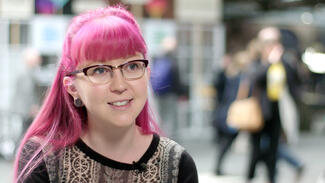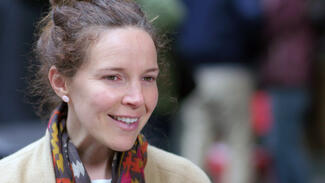
Lisa Winter: What Robot Would You Like to Build?
Mit 10 hat Lisa Winter ihren ersten Roboter gebaut. Einen Kampfroboter. Jetzt, mit Anfang 30, macht sie jungen Frauen Mut, sich selbst am Basteln und Programmieren zu versuchen.
"I didn't go to entrepreneurship school. I just did it and failed and succeeded and learned."
Video abspielen
Schon mal ein Braindate gehabt? Die Kanadierin Christine Renaud hat eine Partnervermittlung der anderen Art aus der Taufe gehoben: Mit den Mitteln von Social Media kommen Menschen zusammen, um ihr Wissen auszutauschen und voneinander zu lernen. Apropos: Ist Ihnen schon mal aufgefallen, dass Kinder in der Schule ganz anders lernen, als es später Erwachsene tun? Vielleicht ist das ja ein Fehler.
Ever had a braindate? Canadian Christine Renaud has launched a dating service with a difference. Using social media people come together to exchange their knowledge and learn from each other. By the way, have you noticed that kids at school learn not like adults do? Perhaps that's a mistake.
Das Gespräch wurde am Rande der re:publica 2017 in Berlin aufgezeichnet.
Jede Woche neu beim Stifterverband:
Die Zukunftsmacher und ihre Visionen für Bildung und Ausbildung, Forschung und Technik
Autor: Timur Diehn
Produktion: Webclip Medien Berlin
für den YouTube-Kanal des Stifterverbandes
The knowledge marketplaces are places that anybody can browse to find the right person to meet, the right topic to explore.
It's interesting in vision of a society where we all as humans learn differently. And we learn more naturally. The way that adults learn like I'm an entrepreneur, I didn't go to entrepreneurship school. I just like did it and failed and succeeded and learned and then had braindates and had beers and coffee with people that are more intelligent than me and that's how I've been learning because I'm thriving for something that I am very passionate about. And I want to become the person that can actually tackle those challenges. That's how I learn. But that's not how kids learn. Kids learn what we tell them that they should be interested in learning, and I think that's the gap that we have to bridge. How can we create an educational context that is meaningful whether you're 6 or, you know, 50 years old.
Facebook and Twitter were just starting being a mass communication, you know, opportunity for communities and humans. And I saw that a lot of people were using social media to launch cry for help when they needed to learn something fast, you know. I need to finish a business plan by tomorrow for a contest and I'm stuck on the marketing plan. Can somebody help me tonight? I'll pay the beer. Or just something like that where I need to pick somebody's brain to propell myself. And I was seeing that myself I learned things that I'm using on a day-to-day basis by conversations that I've had with friends of friends and people that just guide me when I'm stuck or when I need to kickstart something new or new learning. And I was like Ha, people are using social media for that but it's not very efficient, it's an archive, it's not built so people actually can create their offers of knowledge and their request of knowledge, so that's when the idea of e180 came from.
Basically a user comes and creates their profile, and in the profile what you have is very simple is offers of knowledge. So depending on which event you will be using the plattform the offers that you will want to share will probably be different depending on the topic that the event is all about because right now we focus on events. So you create your offers for knowledge, they can be as many as you want, which creates a knowledge marketplace.
Once you find the right topic you just contact a person, you book a braindate in your agenda and when we work with events we have a braindating lounge, so we have matchmakers, we welcome people, as I was mentioning we help them to define their own knowledge and when they confirm the braindate we just check them in, we connect them with their braindate counterpart, and there they go and they sit down and they have their braindate and they share knowledge about a topic that was identified already throughout the booking process.
Many people are like "I don't have anything to offer", "I don't know anything that could be of use to anybody else". So our first work is to help people to gain a consciousness of their own, the value of their own knowledge, basically. So when you work with C2 Montreal for instance the topic is creativity. Don't tell me that there are 6,000 people that are interested in talking about creativity, you're not helping me, I know that because we all gathered around that topic, so we have to help people to define their knowledge in a more precise way, so "OK, I can help with marketing, social marketing strategy to fight HIV in Africa". That's a type of depth that we get in the offers of knowledge that people create in their profiles. So when you sit with somebody you know exactly what you'll be talking about, so the conversation is incredibly useful and relevant. And we've seen things like this kind of power dynamic between the teacher and the learner, something very, very value-producing. And we always say that there's no experts. It's all about sharing what you know. And a good example of that in C2 Montréal, two years ago the most popular offer was an offer of a young woman, she was 22, she was a student, and her offer of knowledge was "I can share my millenial point of view on your product". So it was all about just for her to share her point of view as a young woman on any product that you would like to launch with a certain market in mind. So it's just reframing what it means to know and what it meand to be sharing knowledge and who posesses knowledge. I have another example where we work with salesforce, so with Dreamforce which is a conference with 150,000 people in San Francisco, and it's a tech conference, you know, it's very tech-talk. And a woman shared an offer that was all about how to start a mindfulness meditation practice to overcome stress because working in technology as you know is a very demanding job. And she met somebody and it was a life-changing conversation for both of them, and I think the surprise of finding a likeminded sister at a tech conference with 150,000 people was transformative because it just reconnected you in a moment when you didn't expect it with our common humanity. And these are the stories that we hear constantly when people just sit down together with the will of just "give without agenda", just for the sake of contributing to another person's life. It's transformative because it's just such a generous and beautiful gesture.
We started working with conferences in 2013, so our first partner was a conference called C2 Montréal, so it was a conference that was created with Cirque du Soleil company. About 6,000 people come together to talk about business and creativity and more and more social innovation as well. And our role there again is to help people not just to learn from the expert on stage but learn from one another. Because sometimes the person sitting next to you, especially in these conferences where the level of participants is so high, the person sitting next to you is often as interesting or more interesting than the person on stage. But you don't know who this person is. So our work is to unveil the knowledge available in a room so that the right conversation can take place, so people can learn from each other.